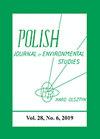The Causal Relationship between Long-Term PM2.5 Exposure and the Risk of Depression: A Two-Sample Mendelian Randomization Study
IF 1.3
4区 环境科学与生态学
Q4 ENVIRONMENTAL SCIENCES
引用次数: 0
Abstract
Several epidemiological studies have indicated that an increased risk of depression was associated with long-term exposure to PM2.5. The objective of our two-sample Mendelian randomization study was to determine the causal relationship between long-term exposure to particulate matter 2.5 and the risk of depression. A two-sample Mendelian randomization study was performed based on GWAS summary data. Forty-six PM2.5-related single nucleotide polymorphisms were suitable for the analysis as instrumental variables. The random-effect model of inverse-variance weighted and the other four methods (weighted median, MR-Egger, Simple mode and weighted mode) were all performed for the analysis. Additionally, multivariate Mendelian randomization analysis was also completed. Our two-sample Mendelian randomization study indicated that exposure to particulate matter 2.5 has a significantly positive impact on the risk of depression ( P = 0.026, random-effect model of inverse-variance weighted). After adjusting for smoking and body mass index in our multivariate Mendelian randomization analysis separately, the relationship between exposure to PM2.5 and the risk of depression remained significant. Based on current GWAS data, our study supplies potential evidence that long-term exposure to PM2.5 is a risk factor for depression. The improvement in air quality may be conducive to reducing the risk of depression.长期 PM2.5 暴露与抑郁风险之间的因果关系:双样本孟德尔随机研究
几项流行病学研究表明,抑郁症风险的增加与长期暴露在PM2.5中有关。我们的两样本孟德尔随机化研究的目的是确定长期暴露于颗粒物2.5与抑郁症风险之间的因果关系。基于GWAS汇总数据进行双样本孟德尔随机化研究。46个与pm2.5相关的单核苷酸多态性适合作为工具变量进行分析。采用反方差加权随机效应模型和加权中位数法、MR-Egger法、简单模式法和加权模式法进行分析。此外,还完成了多变量孟德尔随机化分析。我们的双样本孟德尔随机化研究表明,pm2.5暴露对抑郁风险有显著的正影响(P = 0.026,逆方差加权随机效应模型)。在我们的多变量孟德尔随机化分析中分别调整吸烟和体重指数后,PM2.5暴露与抑郁症风险之间的关系仍然显著。基于目前的GWAS数据,我们的研究提供了长期暴露于PM2.5是抑郁症风险因素的潜在证据。空气质量的改善可能有助于降低患抑郁症的风险。
本文章由计算机程序翻译,如有差异,请以英文原文为准。
求助全文
约1分钟内获得全文
求助全文
来源期刊

Polish Journal of Environmental Studies
环境科学-环境科学
CiteScore
3.10
自引率
11.10%
发文量
430
审稿时长
4 months
期刊介绍:
One of the most important challenges facing the contemporary scientific world are problems connected with environmental protection. Intensive development of industry and agriculture has led to a rise in living standards on one hand, but an increase in environmental degradation on the other. This degradation poses a direct threat to human health and life. Solving these ever-increasing problems which seriously endanger our civilization require the united efforts of scientists and field researchers of many branches.
The "Polish Journal of Environmental Studies" publishes original papers and critical reviews on the following subjects:
-Basic and applied environmental pollution research, including environmental engineering
-Pollution control of atmospheric, water (marine and fresh), soil and biological materials
-Determination of harmful substances, including their metabolic breakdown patterns
-Analytical methods for metabolic breakdown patterns or other chemical degradation patterns in the environment and in biological samples
-Development of new analytical methods, instruments and techniques for controlling pollutants
-Circulation of pollutants in the environment and their effect on living organisms
-Environmentally oriented catalysis
-Hazards to human health and safety
-Waste utilization and management
-Land reclamation
-Conference reports, scientific and technical reports and book reviews
 求助内容:
求助内容: 应助结果提醒方式:
应助结果提醒方式:


